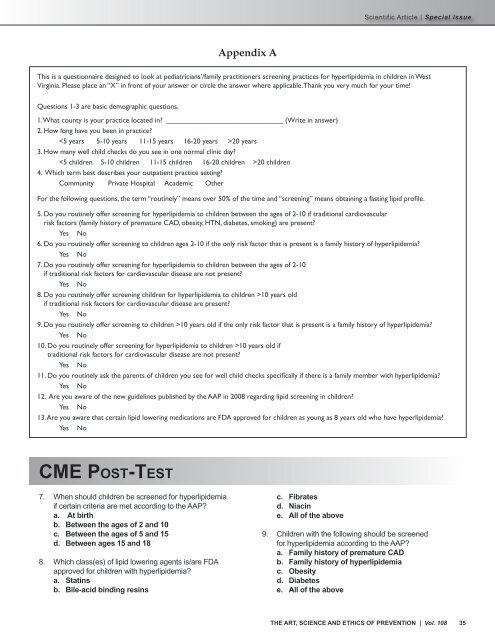Special CME Issue - West Virginia State Medical Association
Special CME Issue - West Virginia State Medical Association
Special CME Issue - West Virginia State Medical Association
You also want an ePaper? Increase the reach of your titles
YUMPU automatically turns print PDFs into web optimized ePapers that Google loves.
Appendix A<br />
This is a questionnaire designed to look at pediatricians’/family practitioners screening practices for hyperlipidemia in children in <strong>West</strong><br />
<strong>Virginia</strong>. Please place an “X” in front of your answer or circle the answer where applicable. Thank you very much for your time!<br />
Questions 1-3 are basic demographic questions.<br />
1. What county is your practice located in? _____________________________ (Write in answer)<br />
2. How long have you been in practice?<br />
20 years<br />
3. How many well child checks do you see in one normal clinic day?<br />
20 children<br />
4. Which term best describes your outpatient practice setting?<br />
Community Private Hospital Academic Other<br />
For the following questions, the term “routinely” means over 50% of the time and “screening” means obtaining a fasting lipid profile.<br />
5. Do you routinely offer screening for hyperlipidemia to children between the ages of 2-10 if traditional cardiovascular<br />
risk factors (family history of premature CAD, obesity, HTN, diabetes, smoking) are present?<br />
Yes No<br />
6. Do you routinely offer screening to children ages 2-10 if the only risk factor that is present is a family history of hyperlipidemia?<br />
Yes No<br />
7. Do you routinely offer screening for hyperlipidemia to children between the ages of 2-10<br />
if traditional risk factors for cardiovascular disease are not present?<br />
Yes No<br />
8. Do you routinely offer screening children for hyperlipidemia to children >10 years old<br />
if traditional risk factors for cardiovascular disease are present?<br />
Yes No<br />
9. Do you routinely offer screening to children >10 years old if the only risk factor that is present is a family history of hyperlipidemia?<br />
Yes No<br />
10. Do you routinely offer screening for hyperlipidemia to children >10 years old if<br />
traditional risk factors for cardiovascular disease are not present?<br />
Yes No<br />
11. Do you routinely ask the parents of children you see for well child checks specifically if there is a family member with hyperlipidemia?<br />
Yes No<br />
12. Are you aware of the new guidelines published by the AAP in 2008 regarding lipid screening in children?<br />
Yes No<br />
13. Are you aware that certain lipid lowering medications are FDA approved for children as young as 8 years old who have hyperlipidemia?<br />
Yes No<br />
<strong>CME</strong> Po s t-Te s t<br />
7. When should children be screened for hyperlipidemia<br />
if certain criteria are met according to the AAP?<br />
a. At birth<br />
b. Between the ages of 2 and 10<br />
c. Between the ages of 5 and 15<br />
d. Between ages 15 and 18<br />
8. Which class(es) of lipid lowering agents is/are FDA<br />
approved for children with hyperlipidemia?<br />
a. Statins<br />
b. Bile-acid binding resins<br />
c. Fibrates<br />
d. Niacin<br />
e. All of the above<br />
9. Children with the following should be screened<br />
for hyperlipidemia according to the AAP?<br />
a. Family history of premature CAD<br />
b. Family history of hyperlipidemia<br />
c. Obesity<br />
d. Diabetes<br />
e. All of the above<br />
THE ART, SCIENCE AND ETHICS OF PREVENTION | Vol. 108 35















